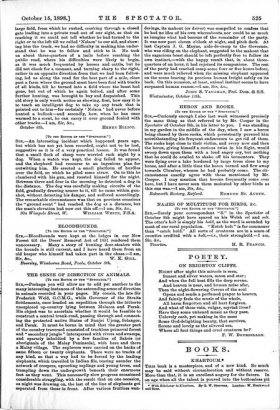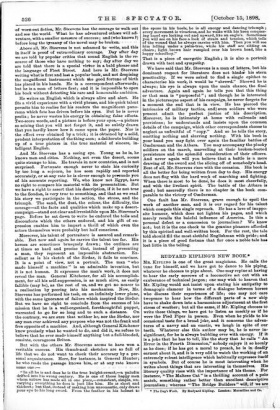BOOKS.
KHARTOUM.°
Tam book is a masterpiece, and of a new kind. So much may be said without circumlocution and without reserve. More than that, it is an excellent augury for the future. In an age when all the talent is poured into the bottomless pit • With Kitchettor to Khartum. By G. W. Steffens, London W. Blackwood and Bons.
-of worn-out fiction, Mr. Steevens has the courage to walk out and see the world. What he has adventured others will ad- venture, with a smaller measure of success ; and (who knows ?) before long the tyranny of the novel may be broken.
Above all, Mr. Steevens is not ashamed to write, and this in itself is proof of extraordinary courage. Day after day we are told by popular critics that sound English is the re- source of those who have nothing to say; day after day we are told that there is a special virtue in a bald phrase and the language of Fleet Street. And here is Mr. Steevens writing what is first and last a popular book, and not despising the magnificent instrument which the good fortune of birth has placed in his hands. He is a correspondent afterwards; but he is a man of letters first; and it is impossible to open his book without detecting his rare and honourable ambition.
He writes an English which is always alive and alert. He fits a vivid experience with a vivid phrase, and his quick talent
permits him to realise for his readers the magnificent pano- rama which fate has driven before his eyes. But he is never prolix ; he never wastes his energy in obtaining false effects.
Two-score words, and a picture is before your eyes,—a picture so seizing that you will not forget it, and so subtly drawn that you hardly know how it came upon the paper. Nor is the effect ever obtained by a trick ; it is obtained by a solid, prudent interpretation of the thing seen; a deliberate building up of a true picture in the true material of sincere, in- telligent English.
And Mr. Steevens has a seeing eye. Young as he is, he knows men and cities. Nothing, not even the desert, seems quite strange to him. He travels in new countries, and is not surprised. Fortunate enough never to stale his curiosity by too long a sojourn, he has seen rapidly and reported
accurately, or at any rate he is clever enough to pessuade you of his accurate reporting. We, who know not Egypt, have no right to compare his material with its presentation. But we have a right to assert that his description, if it be not true to the Soudan, is very true to something, and that as we read his story we participate in the action, the stress, and the triumph. The sand, the duet, the colour, the difficulty, the courage—all the facts and qualities which make up a desert- campaign—stand out clear and irresistible upon Mr. Steevens's page. Before he sat down to write he endured the toils and discomforts which the others endured, and his gift of ex- pression enables him to impart a thrill of which even the actors themselves were probably but half conscious.
Moreover, his talent of portraiture is assured and remark- able. Bat now and again he carries the talent too far. His heroes are sometimes brusquely drawn ; the outlines are at times so hard and precise that, instead of presenting a man, they represent an impossible abstraction. Ex- cellent as is his sketch of the Sirdar, it fails to convince. It is a point of view, not a portrait. The man "who made himself a machine" is an admirable invention, but it is not human. It expresses the man's work, it does not reveal the man. General Kitchener, for all his accomplish. ment, for all his self-suppression, is as much alive, as easily fallible (may be), as the rest of us, and we get no nearer to a realisation by peering into his mechanism. Now, Mr.
Steevens has performed his task, on an infinitely lower plane, with the same ignorance of failure which inspired the Sirdar. But we have no right to conclude from the success of his mission that he is a well-organised, forethoughtfal puppet, warranted to go for so long and to such a distance. On
the contrary, we are sure that neither he, nor the Sirdar, nor any man ever achieved any purpose who was not the frank and free opposite of a machine. And, although General Kitchener knew precisely what he wanted to do, and did it, we refuse to believe that he ever made himself anything but a full-blooded, resolute, courageous Briton.
But with the others Mr. Steevens seems to have won a veritable success. His thumb-nail sketches are so full of life that we do not want to cheek their accuracy by a per-
sonal acquaintance. Here, for instance, is General Hunter; he who reads the passage knows him, or at any rate knows some one
" In all he is and does he is the true knight-errant, —a paladin drifted into his wrong century. He is one of those happy men whom nature has made all in one piece,—consistent, simple, un- varying; everything he does is just like him. He is short and thickset; but that, instead of making him unromantic, only draws your eye to his long swcrd. From the feather in his helmet to the spurs in his heels, he is all energy and dancing triumph ; every movement is vivacious, and he walks with his keen conquer- ing hazel eye looking out and upward, like an eagle's. Sometimes you will see on his face a look of strain and tension, which tells of the wound that he always carries with him. Then you will see him lolling under a palm-tree, while his staff are sitting on chairs; light brown hair rumpled over his brown head, like a happy schoolboy."
That is a piece of energetic English ; it is also a portrait drawn with tact and sympathy.
We have said that Mr. Steevens is a man of letters, but his
dominant respect for literature does not hinder his stern practicality. If we were asked to find a single epithet to characterise his work, it would be "shrewd." Shrewd he is
always; his eye is always upon the main chance, the final adventure. Again and again he tells you that this thing
or that man is " purposeful " ; and though he is interested in the picturesque aspect of his campaign, he never forgets for a moment the end that is in view. He has pierced the intricacies of military tactics, andl even soldiers who were present admit the perfect justice of his description. Moreover, he is intimately at home with railroads and
provisions ; he understands and insists upon the common details of the campaign, which other correspondents choose to neglect as unfruitful of "copy." And so he tells the story, omitting nothing and slurring nothing. With his book in your hand you may fight over again the familiar battles of Omdurman and the Atbara. You may accompany the plucky soldiers on the march, marvelling at their broken-booted persistence and the splendid consideration of their officers.
And never again will you believe that a battle is a mere drawing of the sword and the slicing off of somebody's head. Best of all, Mr. Steevens rises with the occasion. His book is all the better for being written from day to day. His energy does not flag with the hard work of marching and fighting. When there is most to be done, he does it most cheerfully, and with the liveliest spirit. The battle of the Atbara is good ; but assuredly there is no chapter in the book com- parable to the victory of Omdurman.
One fault has Mr. Steevens, grave enough to spoil the work of another man, and it is our regard for his talent which compels this single reproach. He has a love of inappo- site humour, which does not lighten his pages, and which merely recalls the baleful influence of America. Is this a personal defect or a concession to journalism? We know not ; but it is the one check to the genuine pleasure afforded by this spirited and well-written book. For the rest, the tale told should fill the most slothful Englishman with pride; and it is a piece of good fortune that for once a noble tale has lost little in the telling.







































 Previous page
Previous page